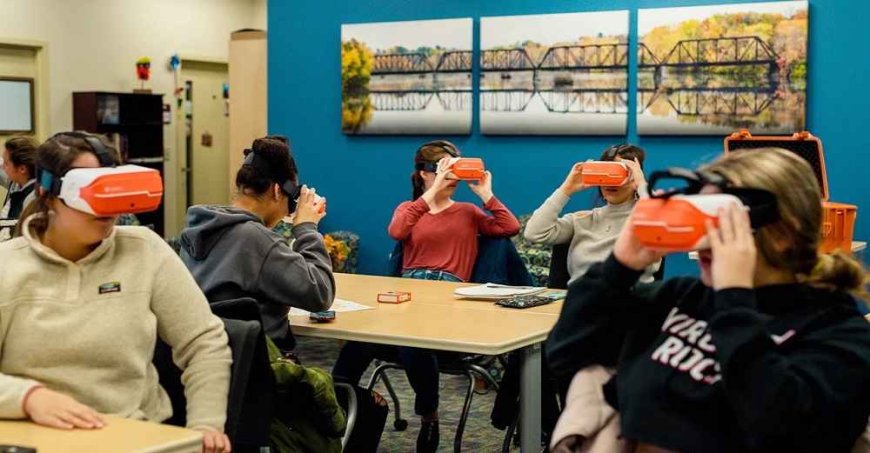Virtual Reality Applications Transforming Education, Entertainment, and Beyond
Virtual Reality (VR) has leaped from the realms of science fiction into reality, transforming the way we interact with the digital world.

Virtual Reality (VR) has leaped from the realms of science fiction into reality, transforming the way we interact with the digital world. With its ability to create lifelike experiences, VR applications have found their way into various industries, revolutionizing education, entertainment, healthcare, and more. In this article, we will delve into the world of virtual reality applications, exploring how this groundbreaking technology is reshaping our lives.
Education: A New Dimension of Learning
Traditional classrooms are no longer the sole domain for learning. Virtual reality has unlocked a new dimension of education, enabling students to embark on immersive journeys without leaving their seats. From exploring the far reaches of the cosmos to stepping into ancient historical events, VR applications enrich learning experiences and make complex concepts more tangible. These applications cater to diverse learning styles, ensuring engagement and retention.
Moreover, VR-based training has emerged as a powerful tool for skill development. Medical students can practice surgeries in a risk-free environment, and pilots can hone their flight skills without real-world consequences. VR is redefining education by fostering experiential learning, boosting knowledge retention, and promoting creativity among learners of all ages.
Entertainment: Redefining the Way We Experience Media
The entertainment industry has witnessed a paradigm shift with the rise of virtual reality applications. VR gaming has taken interactive experiences to new heights, putting players at the center of the action. From adrenaline-pumping adventures to awe-inspiring virtual worlds, gamers can immerse themselves fully, blurring the lines between reality and fantasy.
Furthermore, VR has opened new avenues for storytelling, enabling filmmakers and content creators to craft immersive narratives. Viewers are no longer passive observers but active participants in the unfolding plot. As VR entertainment continues to evolve, it has the potential to reshape the way we consume media and revolutionize the entertainment landscape.
Healthcare: Healing through Immersion
Virtual reality has proven to be a game-changer in the healthcare sector. Medical professionals are utilizing VR applications to treat patients and enhance therapy outcomes. VR-based exposure therapy has shown promising results in treating patients with anxiety disorders, phobias, and artical-traumatic stress disorder (PTSD). By recreating triggering environments in a controlled setting, patients can confront their fears safely and gradually.
Moreover, VR has enabled long-distance consultations, connecting doctors and specialists with patients in remote areas. This not only improves access to healthcare but also reduces the need for patients to travel long distances for medical advice.
Architecture and Design: Visualizing the Future
Architects and designers are harnessing the power of VR to bring their creations to life. VR allows clients to visualize architectural projects in 3D before construction even begins. This level of immersion helps clients understand the design better and make informed decisions. It also aids architects in refining their designs, leading to more efficient and innovative outcomes.
Furthermore, VR applications have extended to urban planning, enabling city planners to simulate and optimize urban spaces. These virtual simulations facilitate informed decision-making and lead to the creation of more sustainable and livable cities.
Tourism and Travel: Virtual Getaways
Virtual reality is reshaping the tourism industry, allowing travelers to explore destinations from the comfort of their homes. VR travel experiences provide a taste of exotic locations, historical landmarks, and natural wonders, inspiring wanderlust and encouraging real-life visits.
Additionally, VR is transforming the way we plan vacations. Travel agencies and websites now offer virtual tours of hotels, resorts, and cruise ships, enabling travelers to make informed choices based on realistic experiences.
As virtual reality applications continue to evolve, their impact across various industries becomes increasingly apparent. Education has been enhanced through immersive learning experiences, while entertainment has reached new levels of interactivity and engagement. In the healthcare sector, VR is proving to be a valuable therapeutic tool, and in architecture, it is revolutionizing the way we visualize and design spaces.
The possibilities of virtual reality seem limitless, promising to reshape industries and redefine human experiences. As technology advances and VR becomes more accessible, we can expect even more groundbreaking applications that will transform the way we live, work, and play. Embracing this immersive frontier with responsible and innovative approaches can unlock the true potential of virtual reality for a better and more interconnected future
